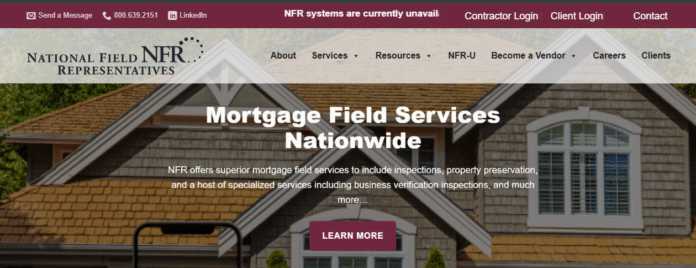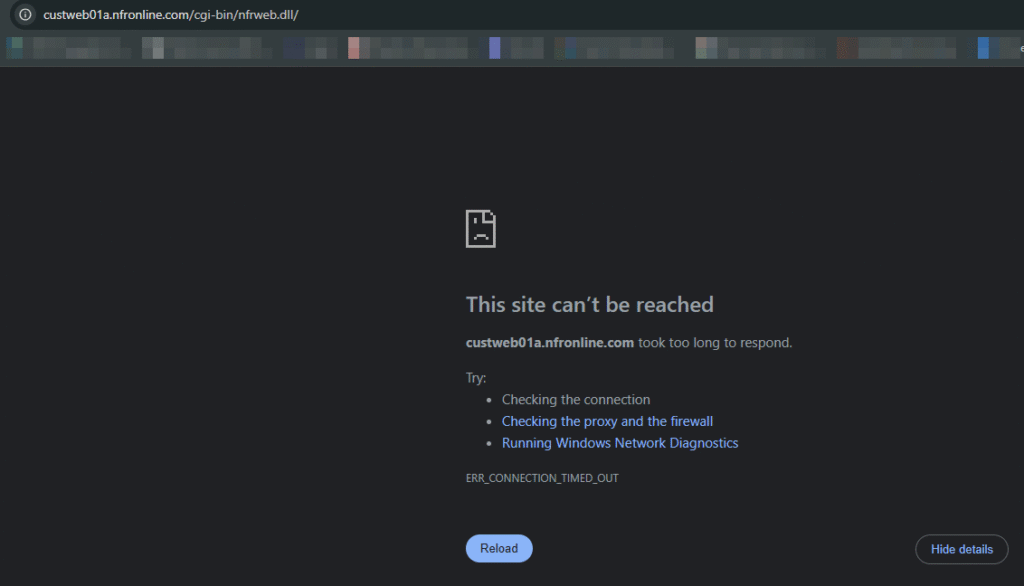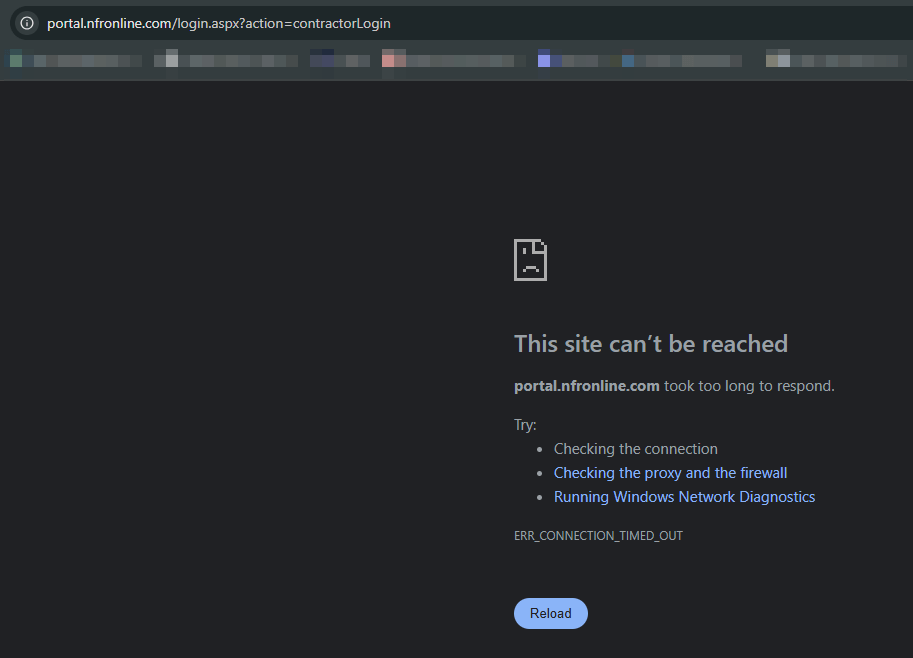The sudden collapse of National Field Representatives’ entire web ecosystem has thrown the mortgage field services industry into chaos, once again exposing the brittle infrastructure upon which billion-dollar financial portfolios depend. Both Clients and Contractors attempting to log into NFR’s portals are met with blank screens and timeout errors, unable to upload photos, bids, or reports. Emails bounce or remain unanswered, leaving thousands of Field Service Technicians and Inspectors stranded without direction. For those under court-ordered eviction deadlines, this digital blackout is not merely an inconvenience—it is a potential violation of judicial timelines that could reverberate back upon labor, despite the failure being entirely corporate in origin. This is the same script the industry has seen before, most notably when Mortgage Contracting Services’ system collapsed for over a week several years ago, leaving similar havoc in its wake. As seen below, both Clients and Contractors have no access.
The labor that holds up the foundation of mortgage field services—Field Service Technicians performing property preservation and Inspectors conducting occupancy and condition reports—relies entirely on portals like NFR’s for communication, documentation, and validation of their work and more importantly pay. When those portals fail, the entire chain of accountability collapses. Contractors are left with completed jobs but no way to upload evidence of performance. Inspectors driving hundreds of miles in a day cannot close out their assignments. Field Service Technicians securing properties or removing debris face deadlines written in servicing agreements that do not account for technological breakdowns. Yet, when the invoices are disputed or payments withheld, it is always labor that shoulders the financial burden, not the hedge funds or servicers outsourcing their compliance obligations. Moreover, though, real fear is reverberating over whether or not this is a hack putting Client and Contractor Personally Identifiable Information (PII) at risk as NFR has refused to be forthcoming over the issues creating the outage.
NFR’s reliance on a homebrew system, developed without meaningful oversight or adherence to industry best practices, is at the heart of this crisis. Unlike enterprise-class platforms with redundancy, monitoring, and external audits, NFR’s ecosystem is cobbled together with little regard for disaster recovery. The absence of transparency in how data is stored and managed now leaves both labor and clients equally blind. In an era where banking institutions demand SOC 2 compliance, penetration testing, and disaster recovery plans from their vendors, mortgage field services remains the Wild West. The firms handling sensitive borrower and tenant data operate with less security and less redundancy than a small-town credit union, yet are entrusted with government contracts and billions in foreclosure pipeline assets.
The consequences of this systemic failure extend beyond unpaid contractors. Court-ordered evictions scheduled this week may not be communicated properly to sheriffs’ offices, tenants, or Field Service Technicians tasked with carrying them out. This not only creates legal jeopardy for servicers but also places technicians in dangerous situations when they arrive on-site with no updated instructions or documentation. A botched eviction due to a failed portal can expose laborers to lawsuits, assault, or criminal accusations of trespassing. Inspectors attempting to prove occupancy status may face accusations of falsification when their reports cannot be uploaded in a timely fashion. Once again, the risk falls squarely on the shoulders of labor while executives remain insulated in their offices.
What makes this situation particularly damning is that it was entirely foreseeable. Foreclosurepedia documented in detail how Mortgage Contracting Services’ system failure paralyzed operations across the industry for more than a week. At that time, there was talk of new oversight, the creation of standards, and the potential for federal agencies like HUD to demand technical compliance from their vendors. Yet nothing materialized. Instead, the same fragile portals and self-built databases remained in place, patched with duct tape and hope, until inevitably they collapsed again. NFR is not an isolated incident; it is merely the next domino in a chain of negligence.
Contractors, meanwhile, are treated as disposable shock absorbers. When a portal goes down, deadlines remain firm, yet there is no channel for contractors to contest the impossibility of compliance. Instead, order mills and nationals use the disruption as an excuse to issue chargebacks, claiming incomplete uploads or late reporting. Field Service Technicians already working at substandard rates now face the insult of withheld payments for circumstances entirely outside their control. Inspectors, whose reimbursement is calculated per report, are left holding gas receipts with no assurance of compensation. The industry has baked into its DNA the idea that labor will always eat the losses, while hedge fund owners and executives remain shielded from consequences.
The absence of a regulatory framework for technology in mortgage field services is glaring. Other industries that deal with sensitive data—healthcare, finance, and insurance—are bound by laws like PCI, DSS and SOX. Yet the platforms contractors are forced to use in mortgage servicing operate in the shadows, untested, unaudited, and unaccountable. NFR’s blackout underscores the need for federal intervention. HUD, Fannie Mae, and Freddie Mac cannot continue to outsource compliance to firms incapable of maintaining basic uptime or redundancy. If labor is expected to carry out time-sensitive, high-risk tasks like evictions and securing distressed properties, then those directing the work must at least provide functioning digital infrastructure.
The ethical implications are no less severe. Borrowers and tenants caught in the foreclosure pipeline are entitled to due process and accurate handling of their cases. When portals go dark, critical updates—such as postponements of foreclosure sales, halts to evictions, or approvals for hardship extensions—cannot be transmitted down the line. Tenants may be unlawfully displaced, or borrowers may lose appeal rights, all because a national contractor could not keep its servers online. The humanity of those living in these properties is trampled under the same systemic negligence that exploits labor. Technology failure becomes a human rights issue when it is directly tied to shelter and displacement.
What is equally troubling is the industry’s collective silence when these failures occur. NFR has issued no public statement, no estimated time of restoration, and no contingency plan for contractors. The hedge funds that ultimately profit from the preservation of distressed properties remain mute. Servicers, too, are unwilling to demand accountability, preferring to keep the system opaque rather than expose the fragility of the vendors they rely upon. This culture of silence protects executives while isolating labor and borrowers. Transparency would reveal how underfunded, underbuilt, and underregulated these systems truly are, and so silence becomes the industry’s defense mechanism.
The lesson of NFR’s collapse is not new, but it is urgent. Until the mortgage field services industry is forced to adopt minimum standards for digital infrastructure, the cycle of failure will continue. Labor will remain the first to suffer, caught between impossible deadlines and opaque portals. Borrowers and tenants will face unlawful displacements. And servicers will continue to operate on the razor’s edge of compliance. The collapse of NFR’s web ecosystem is not just a glitch; it is the latest warning siren of an industry that has refused to modernize, regulate, or take responsibility. If nothing changes, the next blackout will arrive just as surely, and once again, labor will be the casualty.











